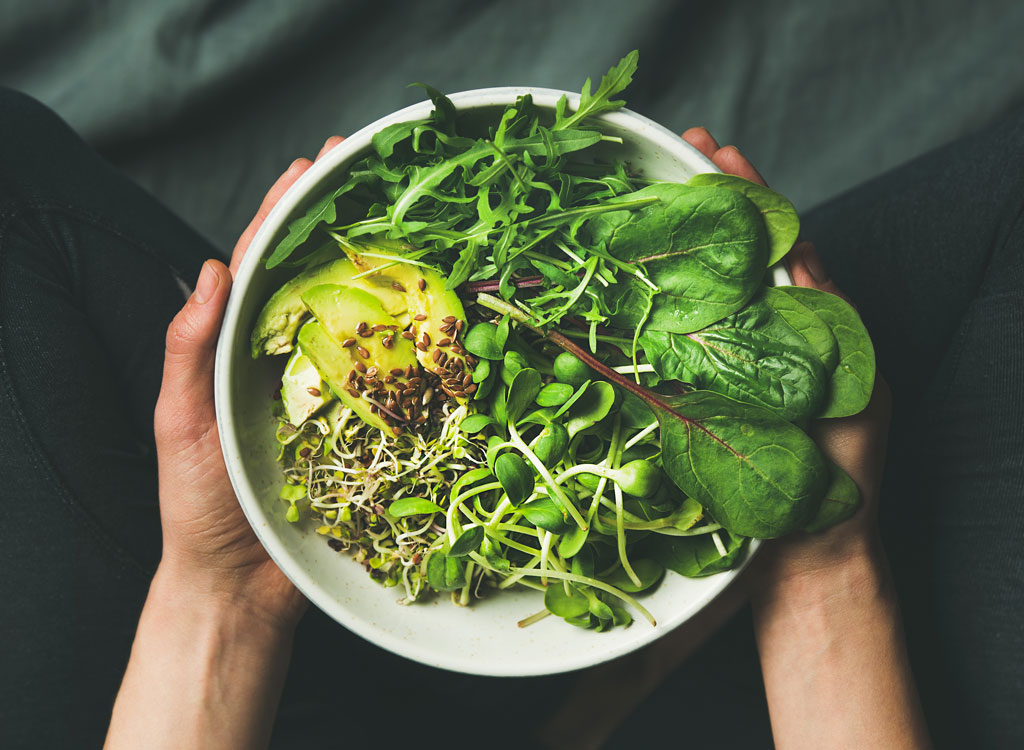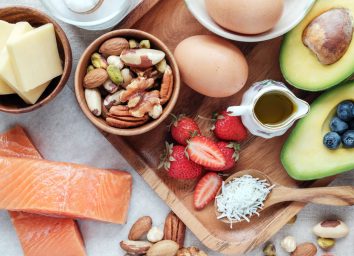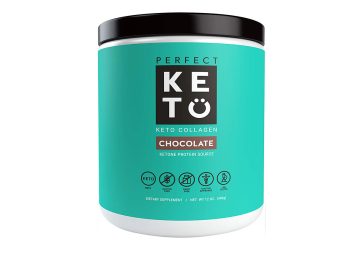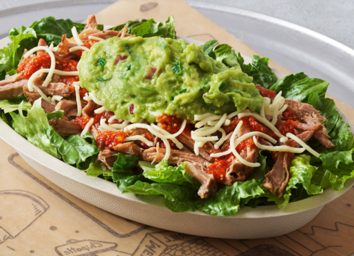Does a Vegetarian Keto Diet Actually Work? Health Experts Weigh In

The keto diet, with its emphasis on consuming foods with high amounts of fat, is usually the diet-of-choice for meat lovers. Although many people think of consuming lots of bacon and greasy burgers when you're doing keto, it's actually possible to take a more plant-based approach and follow a vegetarian keto diet.
By putting a vegetarian spin on the keto diet, dieters are making an effort to lower the amount of saturated fats they consume. But once you cut out carbs and meat, what else is actually left? Can you really create a whole diet around meatless, keto-compliant meals?
Here's the lowdown on how to make a vegetarian keto diet work for you—and what experts recommend you keep in mind.
What exactly is a vegetarian keto diet, anyway?
To understand what's involved with a vegetarian keto diet, you'll need a basic primer on regular keto first. According to the Cleveland Clinic, keto dieters eat meals that are roughly 70 to 80 percent fat, 20 percent protein, and five to 10 percent carbs.
The diet relies on your body entering a state of ketosis, which allows it to generate energy by burning ketones from fat instead of glucose from carbs. In order to do that, you need to have a lot of fat (and very few carbs) for your body to draw on. But to reach those high-fat goals, do you have to load up on meat?
Nope, says registered dietitian Erin Palinski-Wade, RD, CDE, LDN, CPT, author of 2-Day Diabetes Diet: "A keto diet is a high fat, low carb diet, not a high protein diet—so it can be followed as a vegetarian [as long as] you are meeting all of your nutrient needs."
That's the tricky part, though. Sarah Rueven, RD, founder of Rooted Wellness, warns that while a vegetarian keto diet can be healthy, it's also pretty limited.
"Many staples in the vegetarian diet, like whole grains, legumes, fruit, and starchy vegetables, are high in carbohydrates," she says. "Even one serving of these foods can prevent ketosis, the ultimate goal of the keto diet."
This sounds hard! Why do people do it?
Many dietitians are quick to praise the benefits of plant-based diets, which are often associated with lower blood pressure and cholesterol as well as a reduced risk of chronic illnesses. If you're already a vegetarian, going keto could help you lose additional weight or improve your insulin sensitivity, says Palinski-Wade.
And if you're not already a vegetarian, Rueven says that focusing your keto diet around plant-based foods rather than ones chock full of saturated fat (like red and processed meats) could contribute to a decreased risk of heart disease, type 2 diabetes, and certain types of cancer.
What would I actually eat on a vegetarian keto diet?
If you're interested in a vegetarian keto diet but wondering what you would actually eat all day, Palinski-Wade says popular vegetarian keto-friendly foods that are low carb and high fat include:
- Avocados
- Nuts
- Seeds
- Tofu
- Coconut
- Olive oil
To compliment your diet, Rueven suggests incorporating these foods, too:
- Full-fat dairy products like yogurt, milk, and cheese;
- Vegetarian protein sources like tempeh, eggs, and spirulina;
- Low-carb fruits like blueberries, raspberries, and lemons;
- Non-starchy vegetables like tomatoes, cucumbers, broccoli, spinach, kale, mushrooms, cauliflower, and asparagus.
Sample vegetarian keto diet meal plan
Still worried about how you would put together meals and snacks every day? Relax! If you focus on mixing vegetarian protein sources with healthy fat sources while throwing in some fruits or non-starchy vegetables, you should be good to go. Below, Palinski-Wade offers up a sample meal plan to make your daily goals even clearer:
- Breakfast: Spinach omelet or tofu scramble with one half of an avocado
- Lunch: Leafy green salad topped with olive oil, walnuts, pumpkin seeds, and sliced avocado
- Snack: Steamed edamame, celery sticks and almond butter
- Dinner: Greek salad with celery, tomato, and feta topped with sliced hard boiled egg and olive oil dressing
Look closely and you'll see that each meal contains vegetarian protein (like eggs, almond butter, and avocado) and healthy fats (like seeds, nuts, tofu, and olive oil).
Is a vegetarian keto diet healthier or safer than regular keto?
Palinski-Wade says that following a vegetarian keto plan is a healthier option than following the standard keto diet because you'll end up with less saturated fat and a lowered risk for heart disease.
"In general, keto plans can be potentially dangerous if the plan is heavily filled with animal fats and protein, like eating slices of bacon everyday," she says.
But healthier doesn't equal healthy, period. There are still several safety concerns that come with following such a restrictive diet.
"If not well-planned, the vegetarian diet alone can put individuals at risk for deficiencies of vitamin B12, vitamin D, omega-3 fatty acids, iron, and zinc," says Rueven. "This risk increases when nutrient-dense foods like whole grains and legumes are restricted because keto is added into the mix."
Rueven adds that long-term studies about the keto diet are lacking, and even more so for the vegetarian keto diet. In other words, we don't have any idea what the keto diet—or, more specifically, what restricting carbohydrates—does to the body over time.
"Many of the carbohydrate-rich, plant-based foods restricted on the keto diet are great sources of vitamins, minerals, antioxidants, and fiber—all of which are incredibly important for the prevention of chronic diseases and the maintenance of a healthy gut microbiome," Rueven explains.
The takeaway
The bottom line is that a vegetarian keto diet is doable; however, don't be fooled into thinking it's always a healthy choice.
"I would only recommend a full vegetarian keto diet for people who were already vegetarian, because it can significantly limit your meal plan choices [and that] can have a negative impact on compliance long term," says Palinski-Wade.
Instead, she suggests aiming to consume the majority of your food from plant-based sources but not limiting yourself to a completely vegetarian diet while doing keto.
Rueven agrees, saying that the limited nature of the diet "is not likely to be sustainable and can set individuals up for the yo-yo dieting cycle, which can ultimately lead to more weight gain over time and a disordered relationship with food."
Lastly, you definitely need to monitor your nutritional intake. Talking to your doctor and working with a registered dietitian, says Rueven, is a smart way to make sure you won't be losing more than weight (hence why many people need keto diet supplements) while following a vegetarian keto diet.








